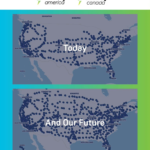Can electric cars be successful as a Taxi? Taxi’s seem to drive lots of miles a day, which would be many more than the 70-100ish mile range of typical electric cars. Where New York City has launched use of Nissan Leaf as taxi’s![]() ahead of deploying the electric e-NV200 minivan, news has come out that limousine companies are looking to use Tesla Model S
ahead of deploying the electric e-NV200 minivan, news has come out that limousine companies are looking to use Tesla Model S![]() with at least one limo company doing so.
with at least one limo company doing so.
The company, Strack Transportation, is not a taxi company but instead offers specialized transportation services (limousines, private jets) to the ultra-rich (a.k.a. the 1%). That means their service isn’t directly comparable to regular taxi service.
However, let’s compare the Model S and the Leaf as taxi’s.
Quick charging is essential for a taxi, because it needs to stay on the road all day long. Both the Leaf and the Model S support quick charging. However, it’s known that the Leaf doesn’t respond well to frequent quick charged and that battery pack capacity diminishes rapidly when it’s frequently quick charged. We don’t know whether the Model S battery pack responds well to quick charging.
Another model for electric taxi’s is fast battery pack exchange, such as the Better Place taxi pilot projects in Amsterdam and elsewhere. However, deployment of Better Place’s infrastructure is pretty limited and is expensive to build out.
A long total driving range will mitigate the need for quick charging. The Model S is the winner here because of its 265 mile electric driving range.
Cost is essential for typical taxi service, because a taxi company has to be able to pay for the car (and make a profit) while charging fares that are probably regulated by the city. Here, the Leaf wins because of its lower price.
In February news coverage of the Nissan Leaf based taxi service in Osaka Japan![]() put it in a poor light. After a couple years the remaining driving range of these taxi’s has diminished rapidly, presumably because of multiple quick charges a day. The taxi owners are feeling frustrated by the cars because they can’t drive far enough to be useful. They like them because of the quiet smooth ride, but with a drastically shortened driving range have a harder time making it a business.
put it in a poor light. After a couple years the remaining driving range of these taxi’s has diminished rapidly, presumably because of multiple quick charges a day. The taxi owners are feeling frustrated by the cars because they can’t drive far enough to be useful. They like them because of the quiet smooth ride, but with a drastically shortened driving range have a harder time making it a business.
- Highway design could decrease death and injury risk, if “we” chose smarter designs - March 28, 2015
- GM really did trademark “range anxiety”, only later to abandon that mark - March 25, 2015
- US Government releases new regulations on hydraulic fracturing, that some call “toothless” - March 20, 2015
- Tesla Motors magic pill to solve range anxiety doesn’t quite instill range confidence - March 19, 2015
- Update on Galena IL oil train – 21 cars involved, which were the supposedly safer CP1232 design - March 7, 2015
- Another oil bomb train – why are they shipping crude oil by train? – Symptoms of fossil fuel addiction - March 6, 2015
- Chevron relinquishes fracking in Romania, as part of broader pull-out from Eastern European fracking operations - February 22, 2015
- Answer anti- electric car articles with truth and pride – truth outshines all distortions - February 19, 2015
- Apple taking big risk on developing a car? Please, Apple, don’t go there! - February 16, 2015
- Toyota, Nissan, Honda working on Japanese fuel cell infrastructure for Japanese government - February 12, 2015










